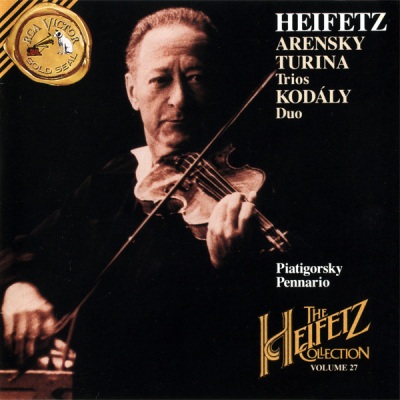
The Heifetz Collection, Volume 27 - Arensky, Turina, Kodály
Notes by Leonard Pennario Jascha Heifetz telephoned in 1961 to invite me to be the pianist in a series of concerts and recordings that he and Gregor Piatigorsky were planning. It was an exciting moment, and it led to the most memorable experience of my professional life. Chamber music had become my favorite form of music ever since the summer of 1949 when Serge Koussevitzky invited me to play at Tanglewood. My concerts were a rousing success, and the conductor asked me to stay on to read through some chamber works with members of the Boston Symphony Orchestra. That unique experience enabled me to get acquainted with many piano trios, quartets and quintets. This wonderful music became my great love. Little did I imagine that 12 years later I would be collaborating in these marvelous ensemble works with Heifetz and Piatigorsky. Our first concerts took place in August 1961 at the Pilgrimage Theatre in Hollywood. Two years later, on September 14 and 22 in Los Angeles, I had the joy of performing six piano trios with Heifetz and Piatigorsky, including the Arensky Op.32 and the Turina Op.35. The next year we played at Carnegie Hall. It was a gala occasion, with a distinguished capacity audience. I also participated in concerts with them at Carnegie Hall in 1966 and in Los Angeles in 1968. All of the works were subsequently recorded. Rehearsals with Jascha and Grisha were the most rewarding occasions imaginable. I learned more about music from those two than from any previous teachers. Contrary to what is generally thought, Heifetz did not dominate the rehearsals. There was give and take, with much stimulating discussion. The unusual thing about our rehearsals was the combination of serious work and fun. I cannot imagine that any group preparing for ensemble performances has ever enjoyed the camaraderie that we three did. In the summer of 1963 there was a heat wave. A typical day: Grisha and I were told to be at the Heifetz home at 9:00 with swimming trunks. There would be three hours of intense work, followed by a swim in the pool. Afterward, lunch would be served by Heifetz's excellent Swedish cook, then two more hours of rehearsing, followed by Ping-Pong. Heifetz was a very fine player, and he usually trounced me. But one day the wind was on my side, and I actually beat him! (Grisha remarked that I might be in serious trouble.) After a delicious dinner we played gin rummy. Heifetz liked games, and we continued to play (including parlor games) at each other's homes for the rest of his life. Jascha did have a lighter side and was not without humor. I feel privileged to have known that "other" Jascha, and can attest to the warmth of his friendship. The Arensky trio is a delectable piece, though in lesser hands it can sound like salon music. With Jascha and Grisha it was elegant. The Scherzo, with its glittering passage work, provides a wonderful opportunity for the pianist. When we played the trio at Carnegie Hall a remarkable thing happened: at the close of the Scherzo, in full view of the audience, Jascha turned to me and, beaming broadly, said, "Bravo." This enormous compliment meant more to me than a hundred rave reviews. The Turina was new to all of us, and we found it a most attractive piece. Grisha was especially fond of it, referring to it as "The Beloved." Once when I was visiting friends in the Detroit area our recording was played for the guests. When Jascha had finished spinning out one of those incredibly beautiful phrases he was so famous for, one listener, a string player in the Detroit Symphony, cried out, "It isn't fair!" At each day of recording there was a morning and afternoon session. Jascha would warm up with Jack Benny's famous exercise, played off key, which had us all in stitches. At the end of the morning session we had delicious sandwiches that Jack Pfeiffer, our producer, had ordered from Nate 'n Al's, Jascha's favorite delicatessen. Then we took a long walk around the block, necessary exercise if we were to continue recording in the afternoon. In addition to the concerts and recordings, there were many evenings when we played a variety of works in each other's homes. Usually Heifetz chose the pieces. But once, at William Primrose's home, Bill suddenly announced, "Tonight is Lenny's night. We'll play three quartets that he'll enjoy doing. " And Jascha quite graciously agreed. I selected the Mozart E-Flat, Dvorak E-Flat and Brahms G Minor. Heifetz claimed never to have played the Mozart. His playing of it was, needless to say, magical. There are countless other wonderful memories of that incredible decade with those two giants. One thing is certain: it was the apex of my career. Los Angeles, 1993
